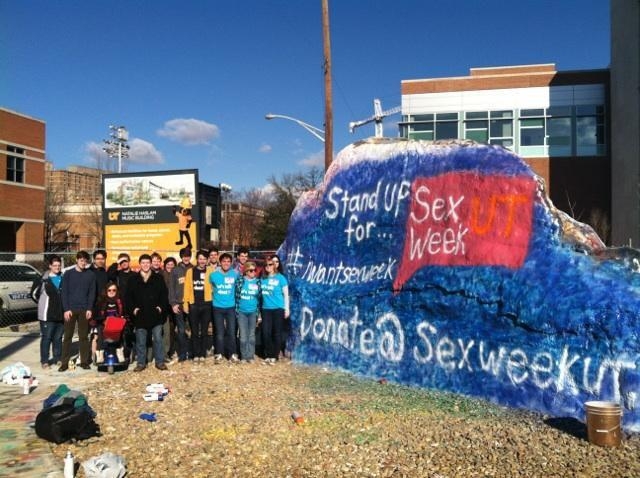You have /5 articles left.
Sign up for a free account or log in.

U. of Tennessee students promote their university's first annual Sex Week, which was successful last spring, despite opposition from state legislators.
Sexual Empowerment and Awareness at Tennessee
If last week’s Internet chatter is any indication, much of the public is fed up with outdated conversations about female college students and sex.
A trend piece in The New York Times, “Sex on Campus: She Can Play That Game, Too” — about the sex lives of college women at the University of Pennsylvania — has been the butt of jokes by critics, who are wondering why it took the Times an entire year of reporting to investigate college hook-up culture and conclude that “there is an increasing realization that young women are propelling it too.” Some have called its findings, at best, underwhelming, while others consider Kate Taylor’s article a “gross miscategorization" of women.
The Criticism
As Taylor herself noted in a recent follow-up interview, “older people” seemed “disturbed and saddened” about the bleak picture the article paints of college dating and young women. According to the article, college women may be having lots of sex — but they don’t seem to be enjoying it.
Arielle Pardes, a senior who founded “Sex Week” at Penn last year (a tradition started at Yale in 2002, which dedicates several days of events to exploring topics of sex and sexual health), said that while the Times article did accurately portray some aspects of hook-up culture at her university, it told only part of the story. “Taylor displays male-female relationships as really dissatisfying,” Pardes said. “That whole idea that everyone is having miserable sex — I don’t think that’s representative.”
Some critics took issue with the article’s “warning” tone, which they felt was intended to worry an older generation of readers about the depressing state of college-age women. In Salon, Anna North calls for the end of “women’s stories,” because they “end up being the things that we subconsciously and then consciously think about women: that they are all victims, that they are in trouble, that what they are doing is bad for them and for society.”
Elizabeth Armstrong, a sociologist at the University of Michigan who has conducted research on sexuality and gender on college campuses and was quoted in Taylor’s article, said in an interview with Inside Higher Ed that most female college students she has interviewed ended up “in pretty serious relationships” at some point in their college careers.
“There isn’t a crisis to be hugely worried about,” Armstrong said. Hook-up culture has not changed all that much since the sexual revolution during the 1960s, she said, and college students today are not having any more sex than their parents did.
In an article that ran last week in The Daily Pennsylvanian, Penn’s student newspaper, students called Taylor’s portrayal of hook-up culture “one-sided.” Some students lamented that the Times piece did not include the voices of men or students who did not identify as straight.
Penn’s Pardes, who was interviewed by Taylor for the article but not quoted, said Taylor’s article was a “missed opportunity.”
Samantha Meier, who helped organize Harvard University's first Sex Week when she was a senior last year, said she’s sick of the same tired storylines when it comes to young women and hooking up. “Was [Taylor] trying to learn about young, upper-middle-class, white women’s sexual experiences? And if so, then why? There is a historic obsession with [that demographic,]” Meier said. “That is pretty much the only story you hear, and it’s a very boring story. Speaking as a white, straight woman who went to an Ivy League institution, I’m tired of hearing about myself.”
Changing the Conversation
While many college women and experts on sexuality may be bored with the media’s narrow narrative of college hook-up culture, many also say that college students do want to have honest conversations about sex. And college students are seeking to promote those conversations on campus — with or without the support of university administrators. What needs discussing, according to many students, are issues less titillating than those that turned up in the article on Penn.
Brianna Rader, a junior, recognized the need for a Sex Week at the University of Tennessee at Knoxville. Since the university is located in a state where abstinence-only education is the only sex ed taught in public schools, many of UT’s students know “very little” about sexually transmitted diseases and ways to practice safe sex by the time they get to college, she said.
“They know just what their buddies say or what they searched on the Internet,” Rader said. She had friends who didn’t know where to find birth control. She said students on her campus were “scared” to talk openly about sex and sexual assault.
Inspired by student-run Sex Weeks at other college campuses, Rader decided to organize a week devoted to discussing sexual health, abstinence, virginity, gender and sexual orientation on her own campus.
Rader and a group of students planned more than 30 events for the week, including an art gallery, a musical production, demonstrations, speakers and discussions.
The students faced backlash from state politicians who threatened to cut funding from the university entirely if administrators allowed taxpayer or tuition money to fund the events. When the administrators responded to the pressure and cut funding from the Sex Week's events, students were able to raise thousands of dollars through private donations. Sex Week became a success, with more than 4,000 students in attendance, said Rader.
“The goal was for everyone to feel comfortable coming to all these events and leave with a comprehensive understanding of sexuality, including health, pleasure and empowerment,” Rader said.
The Sex Week participants at various colleges as well as researchers say there are a number of conversations students and the public “could” be talking about when it comes to college students and sex, which don’t often make their way into the media. Programs like Sex Week, with support from university administrators, help make these conversations possible, Rader said.
Not Everyone Is Doing It All the Time
The Times article may have left some with the impression that college students are hopping from one bed to the next. But according to the data, there are plenty of college students who aren’t having sex at all, or at least not very often.
Buried in Taylor’s article is the fact that 4 in 10 students are either virgins or have had intercourse with only one person, according to the Online College Social Life Survey. And according to data from Paula England, a sociologist at New York University, a college student only has an average of seven “hook-up” partners throughout his or her college career. (Students surveyed could define the term however they saw fit.) England also found that about 80 percent of students hook up, on average, less than once per semester over the course of college.
Kathleen Bogle, a sociology professor at La Salle University in Philadelphia who has studied hook-up culture, said that when she gives talks at colleges, most students say they think other students have seven partners per semester. And this “misperception” between what students think their peers are doing sexually and what they are actually doing is problematic, Bogle said, because students can make decisions based on “distorted” information. “I’m not one of the authors who portrays the hook-up culture as horrible. But there is a big range of what’s going on,” Bogle said. And that wide range of experiences should be talked about more often, she said.
Meier said she is tired of the dichotomy the media presents between abstinence and hooking up.
“It always annoys me when people talk about abstinence as like a thing you do forever until marriage, or as a thing you never do,” Meier said. “Most people are not having sex for some period of their lives while in college for a variety of reasons. Thinking of these things in these black and white terms is missing the experiences of the vast majority of people.”
Faith Informing Sexuality
During Harvard’s premier Sex Week last year, an event on “how faith informs your sexuality,” was one of the week’s most attended and “most interesting,” said Meier. Students from different religious backgrounds discussed how their religious upbringing intersected with their romantic and sexual choices.
“It was fascinating because nobody ever talks about that,” Meier said. “There’s a juxtaposition of faith on one side and sexuality on the other.”
Taylor’s article left out any discussion about the religious backgrounds of the women she interviewed. Some say including this information could have been enlightening.
“Religion is one of the top factors that affects how you view sex,” Tennessee’s Rader said.
When events about faith and sexuality are held on campus, they offer a chance for students to speak who are often “left out of” the sex conversation, said Pardes.
One of Penn’s most successful events of Sex Week last year, according to Pardes, was an interfaith panel with representatives from Penn’s various religious organizations. Students who are religious want to talk about sex as much as anyone else, but they may want to talk about it “in different ways,” she said.
Sexism is Alive and Well
Some college women also reported being frustrated that the Times article only briefly alluded to the sometimes unequal gender dynamics in sexual relationships, without fully addressing the underlying issues of what causes sexual assaults.
By the time Pardes finished reading “Sex on Campus,” she wasn’t sure what argument — if any — was being made. “She makes a claim that women are driving hook-up culture because they found this new way to pursue career ambitions and maintain a sex life,” Pardes said. But then, Taylor uses examples of women, who aren’t having sex because they enjoy it necessarily, but because they’re drunk, or someone asked them to, or they think they won’t fit in if they don’t.
“All of the evidence suggests that men are still controlling the entire sexual marketplace,” Pardes said.
So while Taylor’s piece might skim the surface of a point about gender relations and gender equality, Pardes said the topic warrants a “fuller discussion.”
Armstrong said that whether in the context of hooking up or relationships, the playing field between men and women is not even.
“What [the article] didn’t really emphasize is that all of these women, whether they’re elite, white, black, working class, they’re trying to put their lives together riddled in a place with gender inequality,” she said. The question the public should be asking, is not why or whether women are having sex, but instead: “Do we provide the sort of conditions and peer cultures that if young men and women want to sexually explore that they can both do so safely?” Armstrong said.
A number of high-profile stories involving universities mishandling sexual assault cases have come to the forefront in the past year. It is evidence that sexual assault on college campuses is a more real issue than ever. But Rader said that colleges need to do more than hold alcohol prevention programs or preach to female students about ways to “stay safe” when going out. Colleges and universities should focus on creating open dialogues about sex and gender, so the problem of sexual assault can be stopped from the onset.
“The only way to prevent rape culture is to have conversations and have sex be a comfortable topic,” Rader said, which includes making men a part of the conversation and targeting programs toward them. “University administrators need to be braver and have events that aren’t just sexual-assault focused. They need to focus the conversation around communication.”








